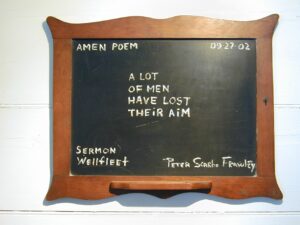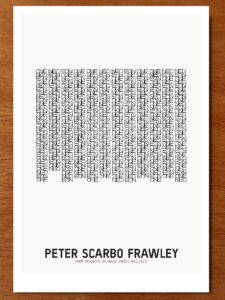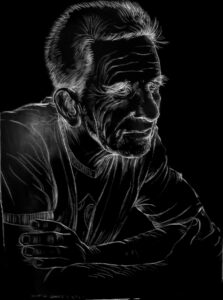Peter Scarbo Frawley, who wrote concrete poetry and supported his family by painting houses, died at the Lily House in Wellfleet on March 17, 2025. He was 81 and had struggled with failing health for several years, said his son, Seamus.

Peter was born in Boston on April 21, 1943 and was raised in Dorchester by his parents, Joseph and Rita Scarbo. Despite being in and out of trouble as a young man, he excelled in school and graduated early from Dorchester High School. He studied for a time at the Boston Architectural Center but decided to devote himself instead to poetry, said Seamus.
Peter moved to Provincetown in 1967, attracted by its artist community. “He found people he could relate to,” said Seamus. He worked at the East End Bookshop, owned by Molly Malone Cook, the partner of poet Mary Oliver. Filmmaker John Waters also worked there, and Oliver was a frequent presence. Peter became interested in beatnik poems and began experimenting with alternative forms of poetry.
Peter was a writing fellow at the Fine Arts Work Center from 1969 to 1971, part of the first cohort of fellows with Keith Althaus, Roger Skillings, and Louise Glück.
In a 2009 interview with Wellfleet gallerist Susie Nielsen, Peter said he liked to operate in the high end and low end of life. The in-between was never his territory.
By the early 1970s, Peter had started creating concrete poetry, a form that emphasizes the visual structure of letters and the sounds of syllables. The visual and literary components of his poems held equal importance.
Peter cited the minimalist poet Aram Saroyan and the experience of listening to peepers in Wellfleet as formative to his understanding of the relationship between poetry and nature and his adoption of concrete poetry as his primary creative pursuit.

“You’re already in a minority position as a poet,” said Althaus, but as a concrete poet “you’re even more out there.” As Peter’s work developed, performance also became an important consideration.
“He believed in poetry of the streets,” said his friend Rob DuToit. In Peter’s visual poems he worked with everyday materials like a Smith Corona typewriter, hand-written lettering on vellum, paint sticks, and chalk on slate.
He wanted his poems to be accessible. Often brief and humorous, they gravitated toward colloquialisms and reflected what he discovered in words. He printed and framed them as artworks, but he also wrote them on sandwich boards by the Wellfleet pier or on chalkboards at the Juice on Commercial Street.
For Peter, a poem could be as simple as the phrase “WOW MOM,” evoking the pain, bewilderment, and wonder of existence. “It may sound cute, but it’s almost like the sound a baby might make when born,” said his friend Kevin Rice.
“He was a genius in a lot of ways,” said Nielsen.
In a chalkboard piece titled “Amen Poem” that he exhibited at Nielsen’s Farm Projects in 2009, Peter wrote, “A lot of men have lost their aim.” The words suggest humor, impermanence, and pathos.
Peter’s epic poem “ONE NEO EON” straddled the line between poetry and performance. He repeated the lines so that the sound of the words became more prominent than their literal meaning, like an incantation. DuToit recalled a staging at the Rising Tide Gallery in Provincetown that included a group of singers, like a Greek chorus. In 2015, he performed it on a Wellfleet basketball court with dancers. “He always envisioned it as a rock opera,” said Rice.

Peter also appeared in local theater, including the inaugural production of Rhinoceros at WHAT and with the Outer Cape Performance Company and the New Provincetown Players. He had a bit part in Norman Mailer’s film Tough Guys Don’t Dance.
Peter met his wife, Mary, at the A-House in Provincetown and they moved in 1972 to Wellfleet, where they raised four children. “He always taught us to be kind and loving and to be open to different types of people and points of view,” said Seamus. “He never judged people.”
To support his family, Peter painted houses in Provincetown’s East End and regularly went to Boston to paint at the Ritz Carlton. “He was particular about getting everything perfect,” said DuToit, who was a member of Peter’s crew along with artist Anthony Fisher. They incorporated poetry in their work. “We’d usually have a poem of the day and a word of the day,” said DuToit.
Some of Peter’s poems were written on paint sticks, with careful attention to the sheen and surface quality of the colors. He created a series of paint stick poems named after his son Ethan, who died of cancer in 2017.
“There was an absolute authenticity about the man,” said Fisher. “No affectation. No bullshit. Just totally genuine.”
Peter and Mary moved to Milton in the early 1990s. They were separated by 1995, and Peter moved back to the Savin Hill neighborhood of Dorchester, where he was raised. It was a difficult time. “He had his demons and fights with depression but always had humor,” said Fisher.

“He felt like he made a huge mistake by moving back to Boston,” said Seamus. “It was one of his only regrets.” Peter and Mary eventually divorced, but “he never stopped being in love with my mother,” said Seamus. “He was a hopeless romantic.”
In 2000, Peter moved back to Wellfleet and had solo exhibitions of his work at Farm Projects in 2009 and 2013.
In Wellfleet, Peter played poker every Wednesday night with a group of friends. Bob Costa, one of the players, recalled visiting Peter at his home on Fred Bell Way and discussing doctor’s visits, confusing prescriptions, and “life on the streets in the old days.”
DuToit said teenagers easily related to Peter. “He was like a folk hero,” he said. “He got along with a lot of younger creative types.” Peter was often seen hanging out in front of the liquor store in Wellfleet center, chatting with passersby.
Peter continued to write poetry until his final days. His last poem was simply “HUH.”
“It was his goodbye gift to everyone,” said Costa.
“He loved hard, and he was most proud of his family,” wrote his daughter, Emily.
Peter is survived by his brothers, Joseph Scarbo of Dennis, David Scarbo of Kauai, Hawaii, and James Scarbo of Hingham; his children, Seamus Frawley and wife Lindsay Frawley of Franklin, Tenn., Emily Frawley Manach and husband Ethan Manach of Wellfleet, and Sebastian Frawley of North Carolina; and his grandchildren, Nemo, Oliver, Josephine, and Freya. He was predeceased by his son Ethan Frawley. His former wife, Mary Frawley, died on April 23. (Her obituary will appear in a later issue of the Independent.)
A memorial for Peter is being planned at Farm Projects in Wellfleet.



